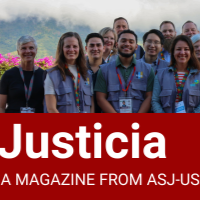Teenage boys playing a rough game of soccer, the field turning muddy from so much play, and coaches and fans on the sidelines yelling encouragement “¡Sí se puede!”—“You can do it!”—is a common sight in Honduras. On a recent morning, though, the shouts of “You can do it!” from the coaches took on a deeper meaning, because the “coaches” are also mentors for Impact Club, a program for high-risk youth run through the Association for a More Just Society’s Gideon Centers.
October 28, 2015
This particular morning the mentors were hosting a soccer tournament for the youth. However, the mentors encourage them not only in soccer matches but also in their lives, investing in them so that they know that they have options besides spending idle days on the street. Impact Clubs use a methodology developed by a group of youth workers in Romania. It involves four main pillars: value and spiritual formation, skill development, and community service projects.
There are eight clubs in four Tegucigalpa neighborhoods that meet weekly. Gideon Center mentors lead them in a story, games, service projects, and of course, a game of soccer.
As a group of boys who were waiting for their turn to play gathered around, two of them, Darwin (18) and Jonathan (17) said proudly that they were both taking classes; Darwin wants to be an engineer, and Jonathan wants to work with computers. They were hesitant to describe what they were like before joining the club, but eventually said that they spent most of their time on the street with friends “who weren’t up to good things.”
When asked why they hung out on the street, with bad company, Darwin thought for a moment and said, “I think it’s because we thought nobody cared about us. But now we know that our mentors care about us, so we behave better.”
Nazaria, the project coordinator, notes that before coming to Impact Club most of the boys were highly vulnerable to joining gangs because they did not have support networks that encouraged them to participate in more positive activities.
Although it’s still a challenge to work with the boys, Nazaria is excited about the progress they’ve seen. She says the boys are beginning to understand that they can study, serve their community, have fun in healthy ways, and eventually work instead of being on the streets.
The soccer tournament that the mentors hosted was just one example of the kinds of possibilities the club opens up for these young people. Sandra, one of the project’s mentors, noted that the boys often think people from other neighborhoods are rivals to be hated—but this tournament showed the boys that they can play with youth from other neighborhoods without conflict.
153 youths from four neighborhoods participated in the tournament; each neighborhood wore a different color shirt and mentors and young women in the Impact Clubs cheered on the sidelines.
The teams enjoyed playing on a beautiful field, with referees in a Tegucigalpa park; this was an exciting opportunity in itself because the boys usually play pick-up games on dusty streets.
As she observed the teams eat their morning snack, Sandra ended by describing the hope she sees in the members of the Impact Clubs, “We love these boys a lot, they are difficult sometimes, but we love them. One time a woman asked me ‘You work with those good-for-nothings, don’t you?’ and I said ‘Excuse me, but they are not good-for-nothings.’ We know that they have problems, but we also see a lot of possibility in them.”
Thanks to the support of mentors like Nazaria and Sandra, the members of the Impact Club are beginning to see the possibility in themselves.
















